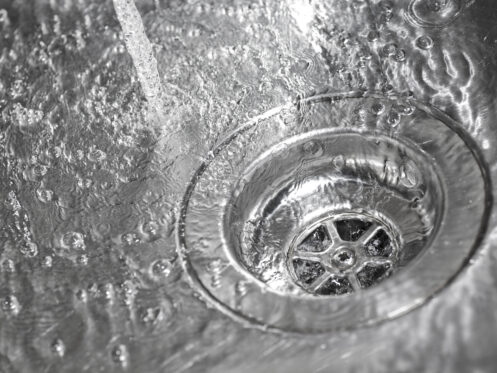Whether you live in an old home or something brand new, you’re bound to experience some problems with your plumbing. Most of the problems you’re likely to encounter come from improper use and not knowing the right way to care for your plumbing. That’s why we’ve created this guide to help dispel some common misconceptions and ensure you avoid the basic mistakes.
1. It’s Fine to Flush ‘Flushable’ Wipes
It wasn’t until fairly recently that the vast majority of people just used toilet paper or occasionally a bidet after using the toilet. Then a number of companies came along and started marketing their “flushable” wipes as a superior, more sanitary alternative. While these wipes can be effective, you’re almost guaranteed to experience serious plumbing issues if you flush them daily.
Toilet paper is the only paper product that’s truly flushable, as it is designed to dissolve in water, and the flushing action of your toilet causes it to break up into small pieces. So-called flushable wipes, on the other hand, remain completely intact and often get left behind as the water from the toilet goes down the drain and sewer system. This then creates a dam or obstruction that prevents toilet paper and everything else from draining out into the municipal sewer main as it should. The end result is that your toilet clogs and no longer flushes properly or, even worse, your sewer line clogs, and the sewage backing up in your house. The same sort of issues also commonly occur from flushing feminine hygiene products, paper towels, and cotton pads.
2. Drain Cleaner Is a Good Solution for Eliminating Clogs
Have you ever heard the saying “Just because something is effective doesn’t mean it’s a good idea?” When talking about a plumbing system, nowhere is this saying more true than when it comes to using drain cleaner to break up clogs.
There’s really no debate about how well and how quickly chemical drain cleaner can break up obstructions and eliminate even stubborn clogs. At the same time, any experienced plumber will also tell you that pouring drain cleaner down a sink, shower or toilet is one of the worst mistakes you can make.
The reason that drain cleaners are so effective at eliminating clogs is that they’re made up of extremely harsh acidic or basic chemicals with a low or high pH. Acidic drain cleaners typically come in liquid form, while basic drain cleaners are usually crystalline. Either type is corrosive enough that it can quickly start eating through the pipes that make up your drain and sewer system and lead to it leaking.
The basic chemicals in crystal drain cleaners are especially concerning. That’s because they contain substances like lye that produce large amounts of heat when mixed with water. The extreme heat helps to quickly melt fats and other materials, but it can also result in major damage to PVC drain and sewer pipes by causing them to melt or warp.
Given the damage you can do to your plumbing system by using drain cleaner, and how much it can cost to repair, your best option for dealing with a clog is using a plunger or pipe snake. If you still can’t unclog the drain, calling a plumber to clear the blockage can help you avoid unnecessary and costly repairs in the future.
3. Pouring Hot Grease Down the Drain Is Safe
Another common misconception is that you can safely pour grease and fat down the drain as long as they’re hot or you flush the drain with plenty of hot water. This isn’t true since grease and fat are hydrophobic and always float on top of water no matter what. That means they leave a residue inside pipes that causes waste, toilet paper, food scraps and everything else to stick. This eventually results in a major clog or obstruction known as a fatberg that’s made out of all of the fat, grease and other solids. Major fatbergs are extremely difficult to get rid of and often require completely replacing the drain or sewer line.
4. Leaky Faucets and Running Toilets Are No Big Deal
Do you have a faucet or shower that keeps dripping or a toilet that you hear running at times during the night? It’s tempting to think that this sort of issue is just something minor that you can ignore. The truth is that this can end up costing you lots of money due to how much water is continually being wasted. A slowly dripping faucet or shower may waste only around a gallon of water per day, but a more serious drip can waste a few hundred gallons of water per month. An issue like a leaky flapper that causes your toilet to frequently run can be even worse and cause your water usage to increase by several thousand gallons per month.
Some issues that can result in a toilet frequently running are fairly simple to fix if you know what the problem is and what repair is necessary. Others, such as replacing a faulty fill valve, will almost always require the help of a plumber. Repairing a leaky faucet can be more difficult, as it requires dismantling everything and determining where the problem is, like a worn-out O-ring, washer, cartridge valve.
5. A Garbage Disposal Can Handle Whatever You Put in It
Having a garbage disposal in the kitchen isn’t as common as it was in the recent past. The main reason for this is that many people don’t know how to use a garbage disposal correctly and end up creating more problems than the disposal solves. The biggest misconception around garbage disposals is that they can easily handle anything and eliminate the need to throw most kitchen scraps in the trash.
The truth is that a garbage disposal is mostly there to prevent kitchen sink clogs by pulverizing whatever leftover food bits get washed down the drain when rinsing and washing the dishes. A garbage disposal can also handle some types of scraps you have when prepping your meals, but you need to make sure you don’t overload it and still throw certain things in the trash. The main things to avoid putting in the disposal are bones and other hard items, anything starchy like rice, pasta, or potatoes, and foods with strong fibers, like celery and squash.
It’s also crucial to never use your garbage disposal without turning the cold water on first. Running cold water helps to keep fats solid, so they go down the drain more easily. Cold water also helps prevent the motor from overheating and causing the disposal to shut off or become damaged.
Pilgrim Plumbing, Inc. has been putting our expertise into helping home and business owners in Norwell, MA and the surrounding areas since 2015. We offer top-notch plumbing solutions and an unparalleled level of customer service.
If you’re looking to avoid or overcome problems with your water, drain and sewer system, give Pilgrim Plumbing, Inc. a call to receive the assistance and advice you need.


